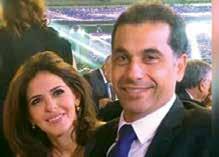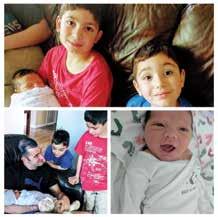
5 minute read
The Adventures of Alexander MacLachlan XV
The Adventures of Alexander MacLachlan:
Rev. Alexander MacLachlan

Doors at IC remained open during WWI
MacLachlan with some staff members
As the Ottoman Empire’s largest Mediterranean port, Smyrna’s harbor came under attack from Allied Forces. The intention was to prevent it being used as a submarine base. Smyrna, itself, was defended by a battery of guns plus minefields that were protected by light guns and searchlights.
In response, Turkish Minister of War, Enver Pasha, ordered the commander of the 4th Army Corps in Smyrna to arrest foreign residents for use as human shields. Police rounded up French, English, Belgian, Montenegrin, and Serb civilians. Out to protect his beloved citizens and yet forced to comply, Smyrna governor, Rahmi Bey, shrewdly made a show of “arresting” all foreign nationals only to quietly release them 48 hours later.
Meanwhile, thousands of Muslim refugees from the Balkans came to Smyrna from Constantinople, bringing with them diseases like typhus and cholera….

Still, International College opened its doors, a few days late, but it opened. The exact number enrolled were 146 day students and 60 boarders from 11 nationalities: Greeks, Armenians, Turks, English, Arabs, Austrians, Americans, Dutch, Albanians, and Poles. Ten of the students were citizens of nations currently at war with Turkey. A skeleton of a faculty was still on campus. Many had returned to their home countries and some were called in for military service. It was up to the few remaining missionaries to teach all the classes.
But, just when MacLachlan thought that the school was up and running, another blow came his way: Turkish authorities forbade all staff who were citizens of countries at war with Turkey to teach. Another six members, including himself, drastically cut down the size of the already dwindling faculty. Basically, the school now depended on five teachers.
Smyrna (Part XV)
MacLachlan rearranged his classes.
Then came another blow: Turkish authorities called on all male citizens of the Ottoman empire – regardless of age – to arms. Two more of IC’s faculty, over 61 years of age, left for military service.
Only three faculty members now remained (one of whom was a British subject but was fortunately overlooked by the Turkish educational authorities).
Still, MacLachlan managed to get the last laugh: foreseeing such a measure, he had his students take their final exams earlier in the year. At least this year was saved.
As for the coming years, Smyrna’s governor and loyal protector of foreign nationals, secretly gave MacLachlan the most absolute assurance that IC may continue to rely on his support and protection against any such interferences with the school in the future.
But, despite these assurances, it was getting increasingly difficult to pretend that all was normal. MacLachlan found himself trying to run a school to the accompaniment of “the heavy boom of heavy guns on the sea front, the hum of aircraft overhead, and the bursting of their destructive shells within a quarter of mile of our campus,” he writes in the 1916 annual report to the American Board of Commissioners for Foreign Mission, adding that an aerial battle almost immediately over the college campus brought four airmen down, one on either side of the campus. Two of the airmen were reportedly blown to pieces.
The campus itself was often strewn with shrapnel fired towards the enemy aircrafts above. The windows of some buildings were occasionally shattered by the bursting of heaving shells. Military tents now extended close along the southern wall of the campus, some within a few feet of the auditorium and “yet in spite of multiplied distractions and calamites we were able to report a year of successful achievement,” he reported.
Meanwhile, pestilence was slowly

The British Naval bombardment of the defenses of Smyrna, the Illustrated War News, Mar 17, 1915
gripping the cosmopolitan picturesque city. Epidemics of typhus, and Asiatic cholera were the biggest threats. IC’s own physician, a member of the Scotch mission in Smyrna, died of typhus while caring for Turkish soldiers in the hospital. MacLachlan reported the death of many of his friends and “we have to thank God that it has not come nigh in our dwellings,” he reported to the Board.
Famine was equally a huge threat. With the prices of all commodities increasing drastically, MacLachlan was urgently searching for food to keep his charges fed.
“Life is getting more and more difficult; all food stuff is an enormous price. No luxuries to be had. We have no sweets for months now. Cholera has started. Potatoes are now very scarce and awfully dear, in fact little by little we can see famine creeping upon us,” wrote Grace Williamson in her diary. She was one of the remaining British Levantine residents who chose to remain in Smyrna and ran a nursing and maternity home. “I met a desperate Mr. MacLachlan this morning. He has been trying for three weeks to get ten bags of flour and although he has all the papers and permits from the Vali, can get us nothing.”
It appears that MacLachlan was not just caring for his students but also for unannounced visitors to the campus. According to the minutes to the Board, up to 2,500 destitute visitors daily flocked to the campus begging for food. Despite his best efforts in running the campus with as little expense as possible (e.g. no electric lights), he finally transferred his self-imposed relief work to the large government soup kitchen in the city.
In the midst of all this, MacLachlan’s daughter, Rosalind, married Cass Reed, the school’s Dean in a small ceremony held at the campus. “Such a “kroio” (cold)”, comments Williamson in her diary, “but I suppose they are happy.”
Despite the wartime measures, the newlyweds managed to go Bairakly (still under Ottoman rule) for their honeymoon. Upon their return, they moved to a house within the College complex.
But the trials of the MacLachlan family and IC itself were still at the beginning as the war raged on with no ending in sight.
To be continued…..
Historical information based on: an interview with Dr. Howard Reed (summer 2011); and Potpourri of Sidelights and Shadows from Turkey, by Alexander MacLachlan, 1937, Grade Williamson Diary of Life during WWI Smyrna, The One Hundred and Sixth Annual Report of the American Board of Commissioner for Foreign Missions, October 24 1916, The Fourteenth Annual President’s Report 1916-1917 by Rev. Alexander MacLachlan.










